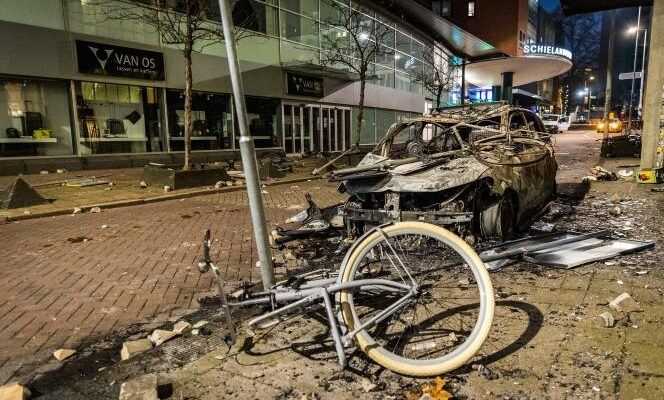For the third consecutive evening, violent demonstrations against the government of Mark Rutte, which last week decreed new health measures, took place in several cities in the Netherlands on Sunday, November 21. The authorities have decided in particular to strengthen the use of the health pass and to close food stores, as well as bars and restaurants at 8 p.m. The kingdom is witnessing a peak in contamination, with a record of new daily infections recorded on Saturday, with 19,700 cases.
Police say 145 people have been apprehended since Friday, November 19. That day, the city of Rotterdam had been literally devastated, and three people had been shot and wounded. Police officers, five of whom were wounded, opened fire in the face of riotous rioters. “We witnessed an orgy of violence”, commented the city’s socialist mayor, Ahmed Aboutaleb. The Minister of Justice, Ferdinand Grapperhaus, spoke of “Criminal behavior”. In Amsterdam, a demonstration scheduled for Saturday had been canceled, but a few thousand people gathered in the central square of the capital.
These events are not the first of their kind, but those that took place earlier this year had not reached such a level of violence. At the end of January, what the media had qualified, for lack of a better “Revolt of boredom”, had erupted for three days in a dozen towns – including in the peaceful Dutch ‘Bible Belt’ in the center of the country. This region, where a very rigorous Calvinism survives, continues to oppose massively to the vaccine, which it judges that it can thwart divine law.
“Disgruntled people who no longer believe in anything”
At the time, the far right was divided over whether to recover the movement. Geert Wilders, the leader of the Party for Freedom (PVV) had called for the intervention of the army to put down the rioters. His rival, Thierry Baudet, leader of the Forum for Democracy (FVD) pleaded for the Dutch “Regain their freedom”.
Right-wing extremists have been present in the ranks of the protesters in recent days, but the movement is much larger. It brings together victims of restrictive measures, defenders of freedoms who consider the measures adopted excessive, heirs of the powerful libertarian movement of the 1980s and 1990s, conspirators and also, as sociologist Jan Willem Duyvendak analyzed in January, “Disgruntled people who no longer believe in anything” and question the words of scientists.
You have 54.57% of this article to read. The rest is for subscribers only.
